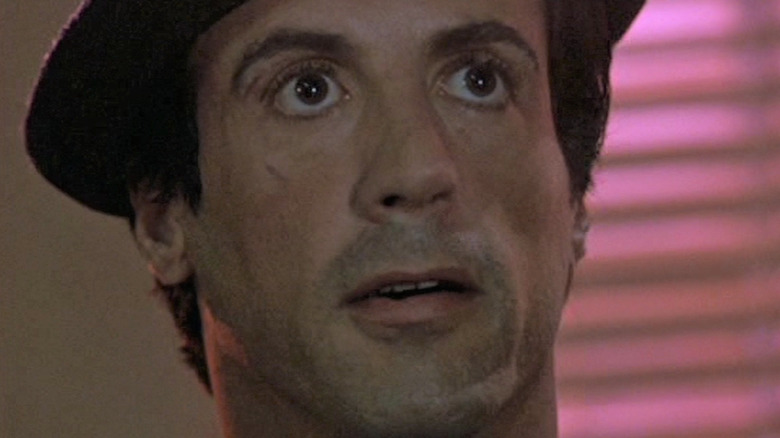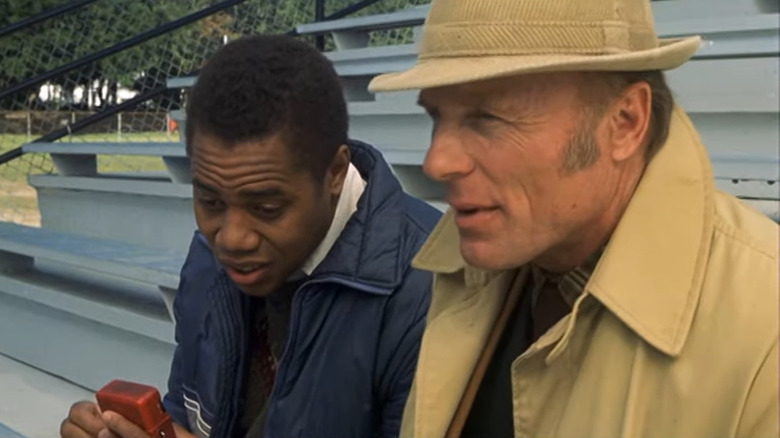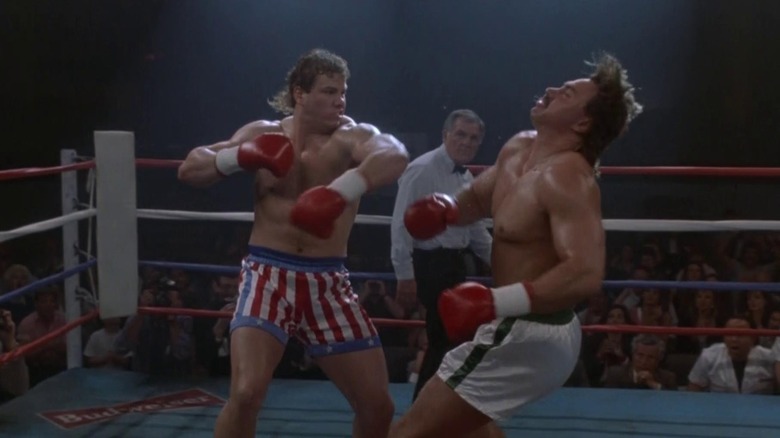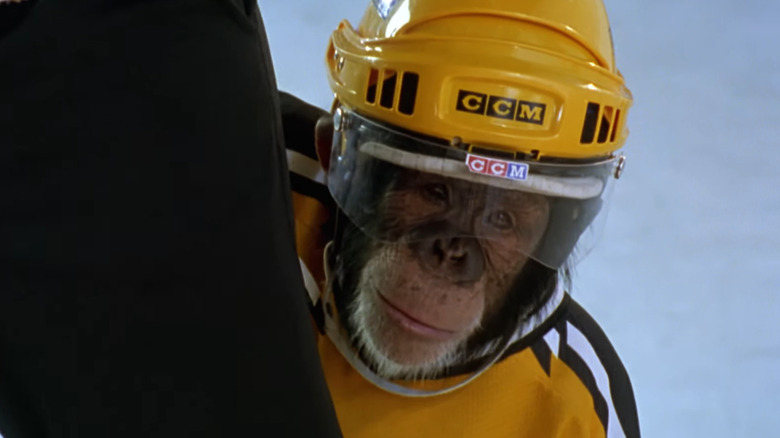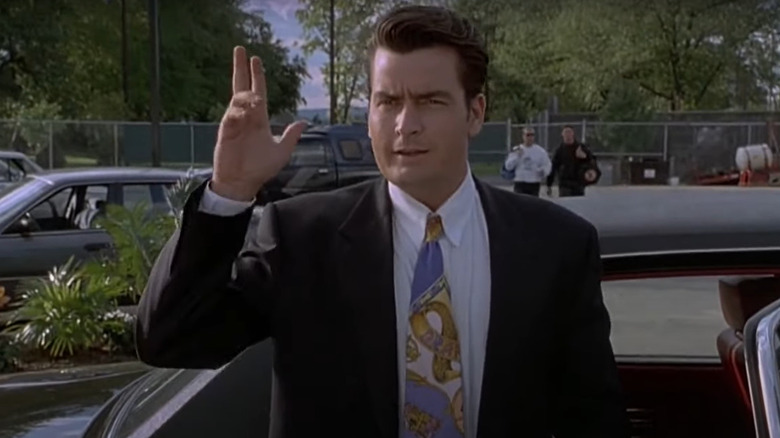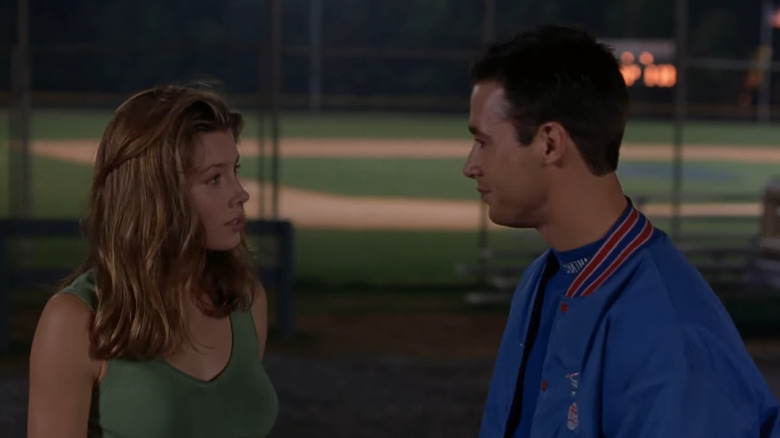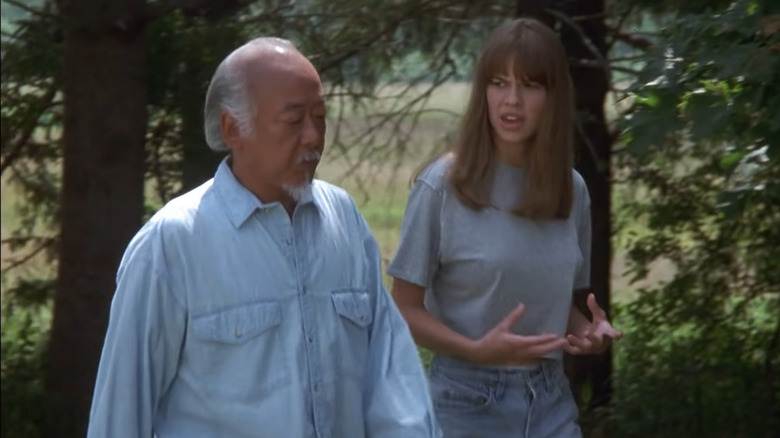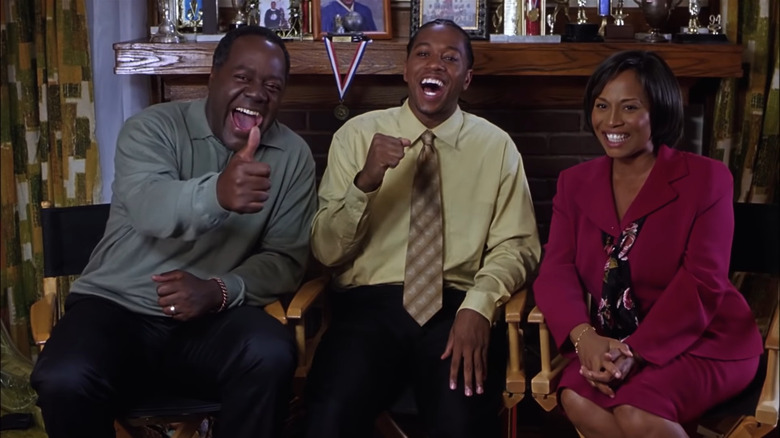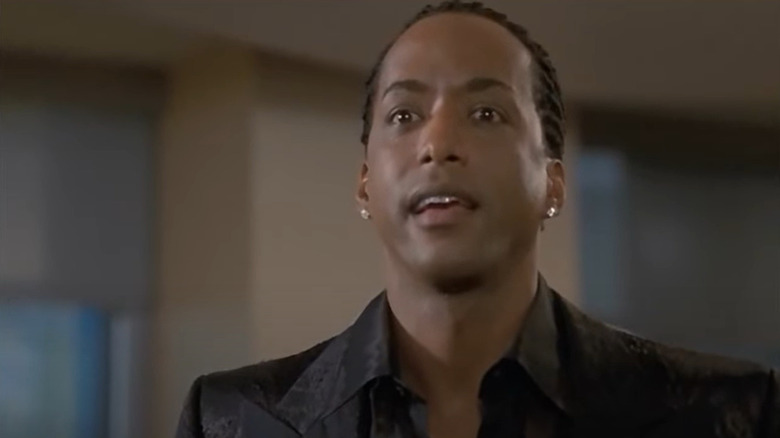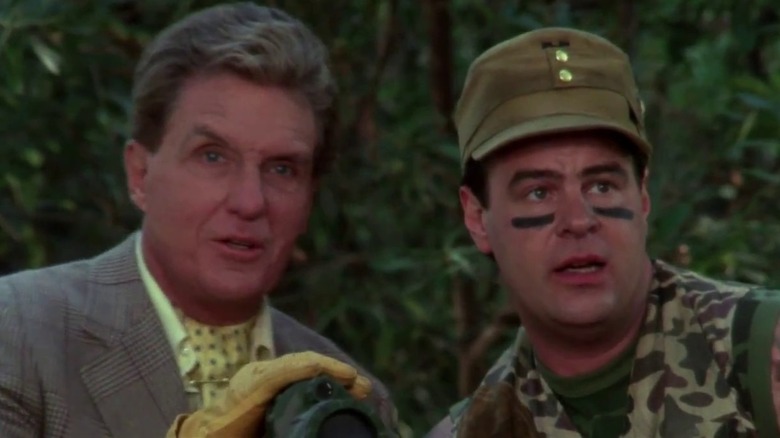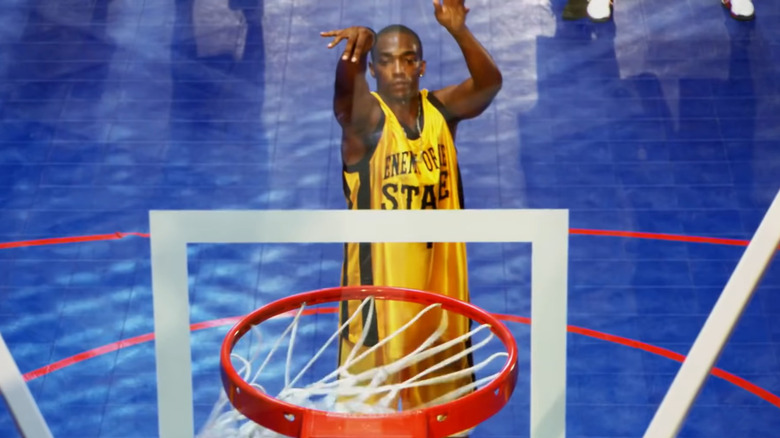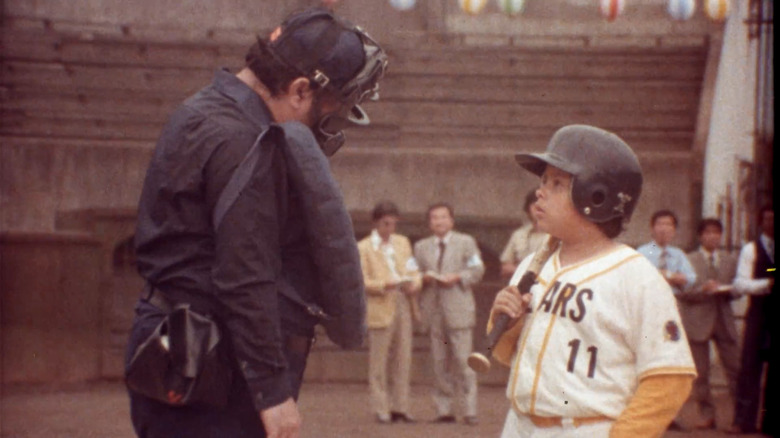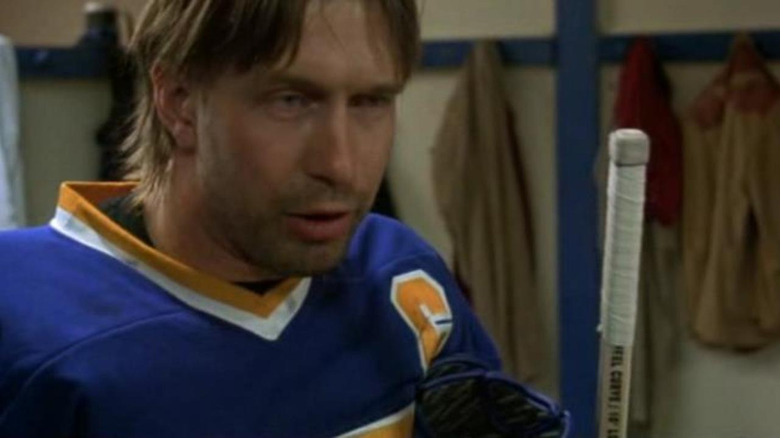Worst Sports Movies Of All Time
Some sports movies are great — we're talking all-time classics like "Raging Bull," "Bull Durham," and plenty of others that don't have "bull" in the title. Of course, others are skippable, and still others — like the ones on this list — are so bad they have to be seen to be believed. For every "Caddyshack," there's a "Caddyshack 2." For every "Rocky" and every "Miracle," there's a disaster that deserves to get KO'd, strike out, or given that feared red card.
We've gone where no one should ever seek to go (the bottom of the $5 DVD bargain bin at Walmart) to seek out some truly unrecommendable sports movie flops. We've got crappy sequels. We've got sports comedies that aren't funny, and sports dramas that are. What we don't have are rousing locker room speeches, epic training montages, or triumphant tales of humans overcoming the odds (just, you know, really crappy versions of all those things).
From baseball bombs to football flops, these are the worst sports movies of all time.
Radio
Is it just us, or were Hollywood actors in the '90s/'00s way too enthusiastic about playing disabled people? That has to be an offensive thing, right? Could they get away with "Forrest Gump" these days?
Anyway, "Radio," based on a true story, stars Cuba Gooding Jr. as the titular character, a young man with special needs whose fascination with local football practices inspires Coach Jones (Ed Harris) to take the guy under his wing. It's almost a good movie, but it slips in all the sugary sweetness and becomes too cheesy for its own good.
It's genuinely hard to tell if Gooding Jr. is doing a good or bad job in the role. There are definitely signs of talent there (we're fully aware this guy can act), but some scenes of him pretending to be disabled are so uncomfortable you'll be fighting the urge to look around the room like, "Is this okay? Am I supposed to like this?" Don't feel bad. After all, everybody else was confused when it came out, as Gooding Jr. won both the NAACP Award for Best Actor and the Razzie for Worst Actor.
Rotten Tomatoes sums it up justly, "The story is heavy on syrupy uplift and turns Radio into a saint/cuddly pet." This film could certainly have been a contributing factor to why we don't see much of Cuba Gooding, Jr. these days.
Rocky V
It's a tale as old as time. A terrific original film is followed up by a string of increasingly unnecessary and lousy sequels. The original "Rocky," of course — which follows the titular character as he trains to box his way out of a middling Philadelphia life by challenging the world heavyweight champion — was one of the best movies of the '70s. It was simple, inspiring, grounded, and human.
The sequels could be lots of fun, but as they dragged on, they traded those qualities for hilariously over-the-top premises and cornball acting. By "Rocky IV," the character was duking it out with a human Terminator as a proxy for the Cold War. But "Rocky V" is where things really fell apart, failing to even grab the "so bad it's good" branch on the way to the ground below. The movie follows Balboa as he runs out of cash thanks to a bad accountant, struggles to get his son to like him, and trains an up-and-comer. Maybe the problem here is that by this point, we'd seen this character beat the odds one too many times and gotten wise to the act. What's next, Rocky battles arthritis and his remote control? Leave the man be.
Rotten Tomatoes nails it with the critics consensus: "'Rocky V's' attempts to recapture the original's working-class grit are as transparently phony as each of the thuddingly obvious plot developments in a misguided installment that sent the franchise flailing into long-term limbo."
MVP: Most Valuable Primate
The concept of a cute pet excelling at sports is good enough for maybe half a movie. But somehow, the "Air Bud" franchise cranked out five total films in which the titular golden retriever kills it at different sports. They finally stopped at the 2003 volleyball one and didn't subject us to "Air Bud: Mutt Mutt Golf" or whatever other direct-to-video dump was next on the list. But then they cranked out the "Air Buddies" movies, based on Bud's pups, and then a few "Santa Paws" movies in which they're repeatedly forced to save Santa Claus for reasons even we have enough self-respect not to investigate.
But guess what? The "Air Bud" franchise isn't the worst example of the pet athlete premise. Instead, the bottom of the heap might be "MVP: Most Valuable Primate." This movie, which launched Air Bud Entertainment's "MVP" trilogy, follows a chimpanzee who plays hockey. Imagine every lame joke or scene you would put into a movie like this if someone was forcing you to make it. Now make it dumber. Keep going. Keep going. There you go.
Of course, nobody could even accidentally mistake a movie like this for serious cinema. It was made to comfort you, not to challenge you. We're not saying otherwise. We're just saying it could've done it better. The few critics who bothered watching it seem to agree.
Major League II
Most franchises decline slowly over the courses of several, increasingly unworthy sequels. The "Major League" franchise decided to nosedive immediately, with a sequel startlingly inferior to the original film.
Thanks to its self-aware silliness and solid sports sequences, 1989's "Major League" — starring Charlie Sheen, Wesley Snipes, and Tom Berenger — is one of the best baseball movies ever made. It's a story of an executive who assembles a losing team on purpose just so she can move them from Cleveland to Miami, only for the players to discover the ruse and start winning just to spite her. What's not to love? According to Rotten Tomatoes, critics and audiences alike were fans.
The 1994 sequel, about the team trying to rally the energy they had in the original movie after blowing it on personal pursuits, sadly lacks the wit and charm that made the original such a special little gem. In fact, that may be putting it politely. This film swings and misses with almost every single gag. Basic common sense and mathematics says they should've accidentally stuck the landing with at least one sequel, but it wasn't to be. The movie is jam-packed with every groan-inducing sports movie cliche imaginable, but it somehow manages to do them all worse than you could even imagine.
The Rotten Tomatoes critics consensus savages the film, saying, "Striking out on every joke, 'Major League II' is a lazy sequel that belongs on the bench."
Summer Catch
"Summer Catch," about a young girl (Jessica Biel) who falls in love with a baseball player (Freddie Prinze Jr), is just ... so Hallmarky. Is that a word yet? Can we make it a word? If anyone has a better term to describe a sugary film that's utterly devoid of teeth or impact, please share it with the class.
Just look at this plot. Ryan Dunne (no, not Ryan Dunn) aspires to join the MLB, and he's fasted from women and booze to realize this dream. But then he meets Tenley Parrish while mowing her lawn for cash, and the two fall in love. Who could've seen that coming? Apparently not their fathers, alcoholic Mr. Dunne and disapproving Mr. Parrish. But somehow, love prevails, and Ryan gets a chance to impress the Phillies. He then joins their minor league affiliate, rather than the actual Phillies, because director-producer Michael Tollin thought he could trick the audience into thinking the film had something to say by giving the protagonist a more realistic (but still happy) ending.
Listen, we're not here to bash the kind of unchallenging fluff you catch your mom watching when you're home for Christmas. There's a place for those. It's called the Hallmark channel. This movie tried to sneak past your defenses by being distributed by Warner Brothers. But we're not fooled.
The Rotten Tomatoes critics consensus sums it up thusly: "A cliched and predictable sports comedy that's mostly devoid of excitement or laughs, 'Summer Catch' is strictly bush-league."
The Next Karate Kid
The original "Karate Kid" is one of the best films of the '80s, and the ongoing success of Netflix's "Cobra Kai" proves the long-running, coming-of-age martial arts franchise still has plenty of crane-kicking and bully-beating left to do. But the series is no stranger to hiccups either. The second two Ralph Macchio-fronted sequels had little to say that the original movie didn't cover well enough. But the worst was yet to come.
In 1994, Hilary Swank made her starring debut in a soft reboot, "The Next Karate Kid," in which her Julie Pierce character — reeling in anger from the death of her parents in a car accident and struggling to get along with her peers and grandmother — is trained by Mr. Miyagi (Pat Morita) to battle her demons with some good old-fashioned karate. It actually sounds fantastic, doesn't it? On paper, at least, it seems like a "Karate Kid" movie starring a female lead, featuring a beloved legacy character like Miyagi to placate skeptical fans, and centering on a battle with inner pain instead of external bullies should've been a different enough take on the formula to rake in the cash and accolades.
But it wasn't to be. Franchise fans detest the film, which the Rotten Tomatoes critics consensus calls an "unnecessary fourth installment" that has "very little to offer." Swank was excellent and, thankfully, undamaged by the flop, but the movie as a whole was just a giant missed opportunity.
The Cookout
"The Cookout" follows rising basketball superstar Todd Anderson, who plans to celebrate signing a $30 million contract with native New Jersey Nets by throwing an old school backyard barbecue for his friends and family at his new mansion. Of course, the party is supposed to happen after he meets with some agents and promoters for an endorsement deal. But then his wacky crew starts arriving early, disrupting the meeting. Soon, there's a nice mix of stoners, rednecks, grumpy old people, and embarrassing cousins and nieces thrown in with the corporate types. Shenanigans ensue, and it's all Anderson can do to juggle the two halves of his life before it all falls apart.
Now, this is the kind of premise that could go in one of two polar opposite directions, with nothing in between. It could either be a brilliant, surprising indie comedy, in which unforgettable, eccentric characters share their folksy wisdom ... or it could be a vapid, predictable flop. As evidenced by its inclusion on this list, it fell into the latter category. Of course, you could probably predict that just by seeing the Happy Madison logo at the beginning of the movie. Mercifully, Adam Sandler himself didn't write, direct, or produce this movie, but it's definitely up his crass, lazy, mostly unfunny alley.
On Rotten Tomatoes, the critics consensus reads, "Good-natured but prepared with an absence of craft, 'The Cookout' is an unappetizing collection of warmed-over jokes."
Juwanna Mann
"White Chicks" might've been the most prominent early-mid 2000s comedy in which men impersonated women, but it wasn't the only one. Shockingly, it wasn't even the worst. That unique dishonor goes to "Juwanna Mann," in which basketball superstar Jamal Jeffries (Miguel A. Nunez Jr.) dresses in drag, takes the movie's title as his new name, and infiltrates a women's basketball team, all after being suspended from the NBA for his outrageous antics on the court. He helps the team win games and even gets a crush on a teammate, but he can't pursue her because it would blow his cover.
This premise just screams early 2000s raunchy comedy. It wouldn't fly today, of course, since it would undoubtedly become a flashpoint for controversy. But in the right hands, at the right time, we can at least imagine it getting some nice reviews. Sadly, there's no "right time" for a movie this bad. "Juwanna Mann" (a play on the phrase "you want a man?" in case that wasn't already clear) was slammed by critics. According to the Rotten Tomatoes critics consensus, "With its tired premise, 'Juwanna Mann's' jokes fall flat."
That's putting it politely. Some of the featured reviews are far nastier, with The Washington Post's Ann Hornaday saying the movie was as "tired and flat as a dead basketball."
Caddyshack 2
How many great originals must be destroyed by lousy sequels before Hollywood learns its lesson? The original "Caddyshack" is, of course, a timeless comedy classic. Starring "SNL" vets Chevy Chase and Bill Murray alongside legends like Rodney Dangerfield, the movie follows a down-on-his-luck kid (Michael O'Keefe) trying to get his life back on track by winning a tournament at a snobby golf club while dealing with all sorts of insane characters. One of the best parts of the film is the fact that each comedian was seemingly let off the leash and allowed to find their own style for the movie.
"Caddyshack 2" ain't got none of that charm. In this 1988 sequel, a wealthy up-and-comer's application to join the elitist club from the original movie is turned down, so he gets revenge by buying the place and turning it into a theme park. Chevy Chase returns, "SNL" legend Dan Aykroyd is in it, and the whole thing's written by Harold Ramis, who's been involved with masterpieces like "Ghostbusters" and "Groundhog Day." It's not like there was a shortage of talent. So what happened?
In short, this sequel to an R-rated original was straightjacketed and rendered toothless by an inexplicable PG rating. On Rotten Tomatoes, the critic's consensus to one of the worst sequels ever made reads, "Handicapped by a family friendly PG rating, even the talents of 'Caddyshack II's' all-star comedic cast can't save it from its lazy, laughless script and uninspired direction." Ouch.
Crossover
If there's anything worse than a bad comedy, it's a movie that thinks it's cool when it's anything but. 2002's "Crossover" follows two best buds –- played by Wesley Jonathan and a very pre-MCU Anthony Mackie –- who travel to Los Angeles to challenge the resident streetball champs for a shot at the throne. Apparently, there's a streetball throne. Whatever.
All you need to know about this movie, which you have never seen and never will see, is that it ends with a "where are they now?" segment in which a voiceover explains what happened to each character after the movie. We cannot begin to fathom the thought process behind this decision or the belief that anyone who watched this inept dump of a film would care enough about any of these characters to appreciate learning that Jewelz broke his ankle in a street game or that Vanessa still works part time at a nail salon.
But maybe the worst part about the movie is the streetball scenes themselves. The one thing you would expect a low-budget sports drama like to get right is that actual sports stuff, right? But the scenes here are flat and uninspired and impossible to care about. Astonishingly, none of the very few people who saw this movie cared much for it. The Rotten Tomatoes critics consensus reads, "This heartfelt but incompetent, cliché-ridden sports picture is the cinematic equivalent of an airball."
The Bad News Bears Go to Japan
It's never a good sign when a movie franchise enters the "X Character Goes to Y Place" (or any similar formula) phase of its downward spiral. But while "Jason Takes Manhattan" was the eighth film in the "Friday the 13th" franchise, "The Bad News Bears Go to Japan" was only the third film in the "Bad News Bears" series. They really did run out of ideas that fast, and yet they still thought it was a good idea to make this movie.
Now, the premise doesn't sound too bad, at least on paper. In the story, Marvin Lazar (Tony Curtis), an unscrupulous promoter, decides to make a quick buck by taking the Bears to Japan, where they face off against the best Little League team in that country, coached by Shimizu (Tomisaburo Wakayama). A subplot involves one of the American kids falling for a Japanese girl who speaks no English. Could've been recommendable in the proper hands, right?
Unfortunately, the proper hands were nowhere to be seen. We couldn't possibly summarize the movie's many confounding misfires better than The Washington Post's Gary Arnold, who wrote a 1978 review titled "The Unbearable Bears." As he put it, "Every aspect of the premise that might supply a source of comic and melodramatic renewal -– the conflicts that arise between kids and other kids, the culture shock of American Little League baseball confronting its Japanese counterpart -– is neglected or shortchanged in favor of lazy self-imitation."
Slapshot 2: Breaking the Ice
"Slapshot 2: Breaking the Ice" is exactly as good as you'd expect a movie with a title including the number 2 and a hockey pun to be. Even worse is the fact that this 2002 direct-to-video bomb is a sequel to a movie that was released all the way back in 1977. The original film, starring Paul Newman as the captain of a hockey team that cranks up the violence to put butts in seats, got (and continues to receive) a good reception, as per Rotten Tomatoes. But a 25-year gap between films is stretching it, don't you think?
And boy, was it not worth the wait. In "Slap Shot 2," time has been no kinder to the Charlestown Chiefs than it was to the franchise still depicting their exploits to an audience of no one. When we revisit the team, they're still up to their excessively violent hijinks but no closer to breaking out of their middling position in the league than they were decades earlier, at least until they're sold to a media company. But when that falls through, they go back to their old shenanigans. Because some things, like staying true to yourself and punching people, apparently, are more important than fame.
The movie bombed, nabbing an ice-cold 0% on Rotten Tomatoes, based on five reviews. One of them, from IGN's KJB, says "I was sent a copy of this film to review on DVD. For free. I still want my money back."
